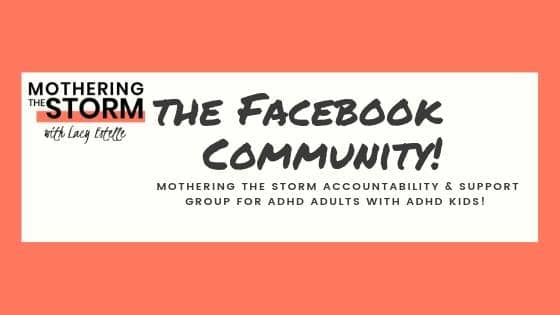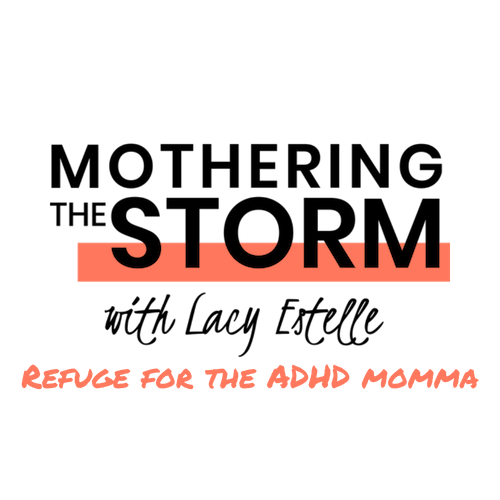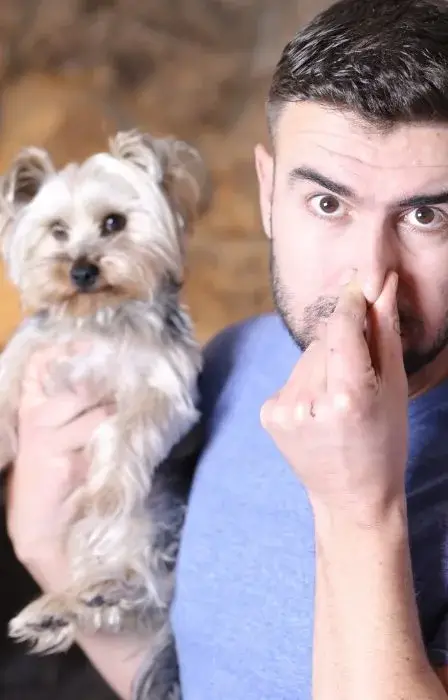This post may contain affiliate links. This means, if you make a purchase from a link on this page, I may receive a small commission at no extra cost to you. You can find our entire disclaimer here.
Tell someone else!
I think my child has ADHD, now what?
You may be wondering how to seek a diagnosis for ADHD in your child, or even if you should. The first symptom of ADHD I saw in my oldest son was the struggle he experienced to sit at the table to finish a meal. I wasn’t alone in witnessing this either.

Click Here to Join the Mothering the Storm Facebook Group! An Encouragement Group For Parents who have ADHD and are also caring for an ADHD Child!
His preschool teachers at the time told me how they were sitting directly behind him with their knees in his chair back. This way he couldn’t push away from the table and get up during his meals. It wasn’t a cruel gesture. It was necessary to enable everyone to eat their food without interruption. Needing to ask or make one child, mine, sit back down in his seat repeatedly was extremely disruptive.
It wasn’t until second grade that all these signs and symptoms came to a head. And even then, we still didn’t pursue a diagnosis immediately. Although, I did begin my search for answers. If I could do things differently, I would’ve sought a diagnosis much sooner.
I am in the State of Michigan, so bear that in mind when considering the sequence of things I suggest. If you are in a state with very different educational procedures, for instance, California maybe or New York, you should consult with an education advocacy center on the best course of action.
Also keep in mind that help means different things to different people. For my younger ADHDer, he needed an Individualized Education Program (IEP) along with other therapies. My older ADHDer is only now beginning to need classroom accommodations. The most recent school year he seemed to battle his responsibilities despite effective medication and therapy.
Overall though, if you think your child has ADHD here are some of the next best steps to take:
1. Talk to their doctor.
In our case, our doctor wanted to refer my children to a Neurologist. The neurologist, while knowledgable about ADHD, didn’t feel the need for formal testing. Because that was important to me I sought a Neuropsychologist. I found a local clinic that accepted our insurance, and would do full neuropsychological testing. Testing that would assess brain development, ability to problem solve, and learning style.
2. Choose a mode of Treatment
Our Neuropsychologist suggested natural treatments first. Healthy eating, as well as putting the brain to work in environments that require heavy focus and concentration. Marksmanship and ballroom dancing were discussed.They can help with spatial reasoning, something many ADHD children struggle with. Spatial reasoning is the ability to navigate your 3D environment by drawing conclusions of your surroundings with the information you have in the moment. I.E. Ballroom dancing uses this while moving across the floor.
We pursued non medicinal treatment for my oldest first but with immeasurable results. While it seemed effective, it wasn’t “enough” help for my oldest. We then chose to consider medication options. After a few failed attempts we finally landed on a medication that worked well for him and is still working well to this day. (When you discuss medication, be sure to ask your doctor lot’s of questions to be certain you have a thorough understanding of what to expect.)

3. Write a letter, and request IEP/504 Service Evaluation with your child’s school
Schools have rules and laws they have to abide by when you seek rights to the Students with Disabilities act. In my state, they have 30 days to respond and also complete testing. I have included a template of how to structure the IEP letter in the resource library. Once you sign up for our mailing list [at the bottom of this post] you will have access to the template and can download it. Consult with your local Education Advocacy agency to make sure you’ve hit all the high points necessary to claim your rights.
Requesting an evaluation does not always equal getting services. Unfortunately to receive services a few key factors have to all come into play. But you can, and should seek services again in the future if you feel you are able.
I can’t recommend enough the value of having an education advocate with you at the meeting. In our case, our Neuropsychologist gave us a step by step plan on how to seek services and that based on his testing each of my children would and should qualify. So if I hadn’t had his guidance, seeking an educational advocate would’ve been in our best interest.
If you like this post, you might also like:
4. Consider enrolling your child in Cognitive Behavioral Therapy
You might be wondering what Cognitive Behavioral therapy can do for your child that you, as a parent, cannot. I think there is something priceless in having a 3rd party, unbiased, non-judging, and open-minded outlet to say however you are feeling. While that is a large component of any therapy, it’s not the only good thing CBT offers. CBT for ADHD focuses on patterns of thoughts and how those thoughts affect our actions.
One thing that is a common element in many children with ADHD is a struggle with self-esteem. Once many of them realize they are behind or different from their neurotypical peers, they begin associating themselves with a negative inner voice. Being told NO more often than their brother and sister. Feeling like they are always bugging people.
Struggling to understand things that everyone else gets quickly can weigh on a child. Eroding in their thoughts, making them question their ability to do anything right. By using CBT to enact short term behavioral based goals, they can get a better grasp of their struggles and strengths. By playing to these and harnessing a strong self awareness they can learn to navigate many problems on their own.
5. Reach out for other alternative treatments and help
I’ve considered and researched all sorts of different treatments for my children from Hyperbaric Oxygen Therapy to Occupational therapy and many in between. Live vitamin treatments and also Evidence Based Learning Interventions I’ve researched many and continue seeking others. Tutoring, Kumon, Hooked on Phonics, even learning the game of chess. All these things can help your ADHD child strengthen those dormant parts of the brain that they need to strengthen. Executive function they will need to function as an adult in any structure and circumstance.
Things will never be easy, for anyone. But people with ADHD need to build their pathways brick by brick as children preferably. So that when faced with adult problems they can revert to these built pathways and remind themselves how they’ve solved similar problems in the past. Without these paths built, they will struggle as adults to overcome obstacles. They may then attempt to shortcut their stress with self medication and self harming habits.
6. Join an Online or In Person support Group
Yes, this is about your child’s ADHD diagnosis. But as an adult navigating these new parenting waters you need allies who get it who have been there. I joined and un-joined probably a dozen different ADHD parenting groups over the past 5-6 years. Like meeting new people you have to get to know the group before you can determine if it’s a good fit for you. Eventually I created a group specifically for this community. You can join it here. If we aren’t for you, that’s fine! But I still encourage you to find support.
7. Get on a First Name Basis with your Child’s Teacher, and YES tell him or her about the Diagnosis
Some may disagree with me here, and that is understandable. Having an ADHD diagnosis can often be linked to being a troublemaker or defiant child. Parents will want to hide that their child is diagnosed with ADHD from teachers in an effort to thwart the teacher pre-judging their abilities.
So far, I have found the opposite to be true. A teacher who knows and understands how my child learns and operates can take the time to teach more effectively. This is because they aren’t guessing on how to help my child stay on track. By having open communication with me, a thorough understanding of their diagnosis and learning habits, it takes the guesswork out of figuring him or her out. If you choose NOT to tell your child’s teacher that they are diagnosed, this may become out of your control when you seek services.
Regardless of what you choose, being involved in your child’s schooling is critical to their success. Whether they have ADHD or not, do your very best to keep in touch with what is going on in their classroom and what they are learning (or struggling to learn).
Of course, everything I say here is simply a guideline. But my hope is it makes clear for you the next step you would like to take in getting the tools in place your child might need. An ADHD diagnosis is not the end of the story by far. It’s simply new information that’s proper use is critical to your child’s success. Use it well.









